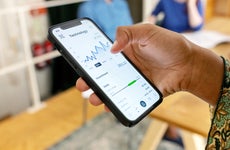FAQ about money market accounts

The Bankrate promise
At Bankrate we strive to help you make smarter financial decisions. While we adhere to strict , this post may contain references to products from our partners. Here's an explanation for .
Our writers and editors used an in-house natural language generation platform to assist with portions of this article, allowing them to focus on adding information that is uniquely helpful. The article was reviewed, fact-checked and edited by our editorial staff prior to publication.
Money market accounts have gained popularity over the past few years as interest rates have risen across all deposit accounts. The most competitive rates have surpassed 4 percent, and in some cases beyond 5 percent.
Money market accounts are useful bank accounts that combine some of the best aspects of checking and savings accounts. If you’re curious about how they work, here are answers to some of the most common questions.
What is a money market account?
A money market account, or MMA, is a type of bank account that combines many of the features of checking and savings accounts.
Like a savings account, money market accounts pay interest on the account’s balance. In some cases, the interest rate will increase as your balance increases. And like checking accounts, money market accounts can come with checkbooks and debit cards to give you easy access to your money.
Who offers money market accounts?
Many banks offer money market accounts, though not every bank has one. Three major banks that offer money market accounts include Ally Bank, Bank of America and CIT Bank.
Credit unions also offer money market accounts.
Are money market accounts FDIC-insured?
Money market accounts offered at banks that are insured by the Federal Deposit Insurance Corp. (FDIC) receive the same level of FDIC insurance as other types of bank accounts including savings accounts, certificates of deposit (CDs) and checking accounts.
A money market account covered by FDIC insurance is protected up to $250,000 per depositor, per insured bank for each account ownership category, according to the FDIC.
The same insurance protection is offered for money market accounts at credit unions that are federally insured by the National Credit Union Administration (NCUA).
Can you lose your money in a money market account?
In most cases, no. As long as you have up to $250,000 in your money market account at a federally insured financial institution, your money is insured. In the event that the bank is unable to return your funds, the FDIC or NCUA will reimburse you for the amount lost.
When can you withdraw from a money market account?
You can withdraw money from your money market account whenever you’d like. However, your bank may place limits on how many withdrawals you can make in a single statement period. Additional withdrawals typically incur a fee. In some cases, if you withdraw excessively, your bank may convert your money market account into a checking account.
Certain transactions, such as ATM withdrawals or in-person withdrawals at the bank, usually don’t count toward this limit, while debit card purchases, online transfers and check transactions do.
Can you close a money market account anytime?
Yes, you can, just like you would do so with a checking or savings account. However, keep in mind that some banks will charge an account closure fee, especially if you close the account shortly after opening it.
What is the downside of a money market account?
Money market accounts combine the features of checking and savings accounts, but they place additional restrictions on your money, which limits their usefulness as checking account replacements. For example, you usually can only write a limited number of checks or online transactions per statement period.
Money market accounts also tend to have higher minimum balances and/or fees than checking or savings accounts. For example, PNC’s basic checking account comes with a monthly service fee of $7, compared with a $12 fee for the money market account.
Do money market accounts have minimum balances?
Yes, many money market accounts have minimum balance requirements, either to open the account, earn interest or avoid fees. With some banks, the minimum balance requirements are higher for a money market account than a savings or checking account.
What’s the difference between a money market account and other account options?
Money market account vs. traditional savings account
Money market accounts combine aspects of savings accounts and checking accounts. The primary difference between a money market account and a savings account is how you can access your money.
With a money market account, you’ll typically get a checkbook and/or debit card. You can write checks against the account’s balance or use the debit card to make purchases and withdraw money from ATMs.
Savings accounts typically don’t offer checkbooks and debit cards, meaning you have to withdraw money at a branch of your bank or transfer funds to a checking account to access them.
Money market account vs. a CD
A CD is a type of time deposit account. When you open a CD, you select a term for the account and must keep your money in the account for the full term. If you make an early withdrawal, you have to pay a penalty.
Money market accounts are more flexible, allowing deposits and withdrawals at any time, though with some limitations on the number of withdrawals you can make in a single statement period.
Money market account vs. a checking account
The primary difference between a money market account and a checking account is the restrictions on how you can access your money.
Both accounts come with debit cards and checkbooks that you can easily use to access your account’s balance. Checking accounts typically place no limit on the number of transactions you can make in a single statement period. With a money market account, however, you’re typically limited to six withdrawals and transfers per statement, though some transactions, such as in-person withdrawals, don’t count toward this limit.
What is a money market account’s interest rate?
The interest rate offered by a money market account will vary from bank to bank. In some cases, the rate will be higher than the bank’s savings account’s rates, and in other cases, it will be lower.
Many banks will offer higher rates on larger balances as an incentive for people to keep large amounts in their accounts.
If you’re looking to earn a good interest rate, check out our list of the best money market account interest rates.
Does a money market account have a monthly service charge?
Many banks charge a monthly fee for their money market accounts, though there are also lots of banks that have no fees. For example, Ally Bank has no minimum balance or monthly fee for its money market account.
Usually, if a bank charges a monthly fee for its money market account, there are ways to avoid the fee. An example is CIBC Bank, which charges a $15 monthly fee. You can avoid the fee by maintaining a $2,500 minimum balance.
Do money market accounts have time limits or terms?
Money market accounts don’t have time limits or terms. You can deposit or withdraw money from the account at any time, though there may be limits on how many withdrawals or transfers you can make in a single statement period.
Can I overdraw a money market account?
Whether you can overdraw your money market account depends on the bank you’re using. Some banks will permit overdrafts while others won’t offer any overdraft service.
Keep in mind that overdrawing your account may incur a fee or may draw from a line of credit with an extremely high interest rate.
Bottom line
Money market accounts offer a great combination of features from checking and savings accounts, making them a valuable tool for managing your money. They are offered by many financial institutions and are federally insured at member banks and credit unions, providing peace of mind for your funds.
While there may be some limitations and fees associated with these accounts, they can be a useful option for those with a significant amount of money looking for easy access and a decent interest rate.
– Bankrate’s Marcos Cabello contributed to an update of this story.
Related Articles



